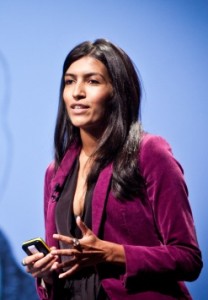Leila Janah Charyath began her career in humanitarian work at the age of 16 after graduating from high school a semester early. She chose to spend her free semester working at a school for blind children in rural Ghana. There, she learned that one of the world’s biggest problems is wasted talent, particularly in Africa, where unemployment rates for skilled workers can be above 60%. Today Leila is the founder and CEO of Samacourse, a non-profit organization employing women, refugees and youth living in extreme poverty via computer-based microwork. She speaks below with Women Of Green staff writer Jason Graham about sustainable outsourcing and human intelligence as a green product.
[youtube]http://www.youtube.com/watch?v=lUrklbx-hK0[/youtube]
Leila, tell us about the concept of Samasource and how you came up with it.
Through my studies I became increasingly disillusioned with the international aid system. I think we systematically deny poor people the chance to engage as equals in the global economic order. At best, we give them handouts or tiny loans and hope they will suffer a bit less from extreme poverty. We don’t view them as equals. We don’t acknowledge that a brain is a brain, regardless of the body and nationality it was born into. Brain-power is the most overlooked resource in developing countries, but with just a handful of computers per center, we enable poor but educated people to pull themselves out of despondence.
Samasource is a start-up and a non-profit which functions on a formula that can be applicable all over the world. It rethinks traditional outsourcing, representing a new concept, and a new way of doing business in this global society which is not only sustainable in an environmental way, but also sustainable on a human level – creating growth space and fertile grounds for human development from the bottom up! What Samasource effectuates is the connection between educated women, refugees and youth in extreme poverty (Nepal, Nairobi, Uganda, Kenya, Uganda, India, Pakistan, Haiti and soon even in the USA) – giving them the employment training they need to manage computer based Data Entry work (data scraping, image moderation, transcription, translation) for large American companies including Google, Facebook and LinkedIn.
What are the real effects of such job creation?
Microwork gives marginalized people a chance to earn a living by playing a vital role in the business processes of big companies. In parallel, the organization assists local entrepreneurs in running microwork centers, helping to grow a new pool of business talent across the developing world.
These small computer-based tasks can be done online using inexpensive computers and free software, generate life changing income! Since its beginning in 2008, Samasource has made over $1-million in revenue (85% of which went to the workers). Not only do people find a new source of freedom and respect within their communities, but they gain leadership, entrepreneurial skills, technical and communicative tools to expand further on their own, creating community enterprises and even new jobs! As the world becomes increasingly interdependent, helping the poor to become computer educated critically bridges the digital divide and evens out the employment playing field!
What do you think of when you hear the word ‘green’? How does the word apply to the work done by Samasource?
Green definately appeals to Samacoure! Samasource creates jobs in regions where more traditional forms of employment in low-income economies, such as manufacturing, are difficult to scale because of poor infrastructure. In a village in Rukka, India, for example, our small data entry partner employs over 60 people doing various types of internet research for Samasource.
In terms of environmental impact, Samasource jobs are very green. Our product is human intelligence, and it’s transported through the Internet rather than via carbon-intensive trucking, shipping, and warehousing. Our centers are low-cost (our Haiti facility was started with under $20,000 and uses low-energy netbooks) and environmentally lightweight. Compared to the impact of building a factory, Samasource centers use far less water, power, and heavy machinery. Samasource has never formally attained green certification as its current focus as a startup is on maximizing the number of workers and level of impact per worker at Samasource, though the organization hopes to explore this further at a later date.
What are some current projects are you working on?
I continue to work on developing computer literacy and computer-based microwork, most recently visiting women in Liberia and Sierra Leone on the US State Department trip to West Africa. Samasource is gearing up to partner with USAID’s Reading Foundation and, in April, I will be speaking at the Global Philanthropy Forum in Redwood City, CA (4/13/11) and the Global Engagement Summit at Northwestern University, Evanston, IL (4/23/11). Lastly, I have recently published an article entitled How Online Work will Save America in a run-up to develop a US-based program.
Leila’s Links:
www.samasource.org
www.leilajanah.com
Leila Janah Charyath has a degree in economic development from Harvard University and has, since the age of 16, worked in various roles in the development sector. While in school, she co-founded the Harvard Rwanda Project and published findings in the Journal of Peace Psychology. In 2006, Leila became the youngest consultant at the World Bank’s Development Research Group. After attaining her BA, Leila set up the Global Health Initiative with renowned philosopher Thomas Pogge. She is a key player in the increasingly innovative field of social justice and sustainable humanitarian work and won $22,000 in grant money from the Business in Development Network for her business ideas. With this money, she was able to launch Samasource. In 2010 alone, she has been featured in Forbes magazine, The Financial Times and Huffington Post. Leila is also a public speaker, she has appeared at forums such as Bill Clinton’s Global Initiative.
